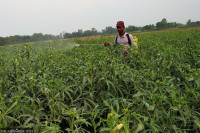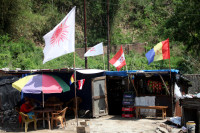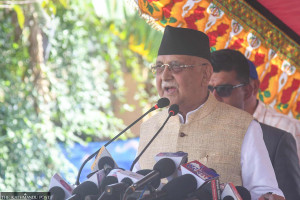Opinion
The future is green
Nepal has an advantage in organic food production, given its diverse agro-ecology and proximity to fast-growing food markets
Surya P Bhattarai
I was born 49 years ago on a family farm during the busy farming season. My mother carried farm yard manure from home to the rice fields for fertiliser and cautiously managed seeds, farming systems, land, and cropping methods. Now in her 70s, she continues to actively farm. The secret behind the success of our family farm is the judicial management of water, compost, a choice of variety (disease/pest tolerance), managing rotations/cultivations, incorporation of cash crops, and developing consumer confidence in the produce (informal branding).
This is Nepal’s past, but it is also Nepal’s future. We have missed the excesses of ‘industrial agriculture’ and effectively maintained organic practices. Now that the world values such practices, we have an opportunity.
Less export
We certainly have threats—Nepal increasingly imports produce from the global market. On the contrary, there are hardly any Nepali agricultural products, except for organic coffee, tea, large cardamom, ginger, and non-timber forest products (NTFPs) that are exported. Nepal’s claim to be an agriculture-based economy no longer holds true, as the import of agricultural products is five times the export. The agricultural trade deficit was Rs 46 billion in the first half of the current fiscal year. The export of Nepali agricultural products is largely limited to organic produce. Furthermore, the production and marketing costs for conventional agricultural products, with low customer confidence, makes it hard for Nepali products to compete in international markets.
Worryingly, the new generation’s interest in farming has been declining due to decreasing returns associated with poor marketability, loss of customer confidence (in local produce), and the deteriorating social image of farming. This poses a major challenge and requires a rigorous review of current agriculture practices. Nepal must streamline farming methods consistent with major drivers for food demand, eg ‘safer food’, which is absolutely critical for the future of Nepali agriculture.
Big markets
There are rapidly growing organic food markets in Nepal’s vicinity. So the country can be an organic food bowl for large consumer bases in India and China. The Indian organic food market is growing rapidly, estimated at Rs 1,000 crore ($170 million), of which Rs 700 crore came from exports and is growing at 30-40 percent annually. However, India has only 4.43 million hectares under organic cultivation, with a total organic certified production of 171,100 tonnes.
China, with a population of over 1.3 billion, has emerged as the world’s largest consumer market for food and beverages, surpassing the US ($26 billion) and the European Union ($10 billion) in 2011. China is the fastest growing food market in Asia, with an average annual growth rate of 30 percent in the past five years, valued at $98 billion. Estimates show that China had only 2.03 million hectares of certified organic farmland in 2009, while total organic production was valued at $2.4 billion, of which $500 million was exported and the remaining sold locally. Organic imports by China were estimated at about $20 million in 2009.
The large organic consumer base of Indian and Chinese markets are invariably searching for safer food. This offers Nepal a unique opportunity for organic food production. However, winning the confidence of consumers is crucial to tap into such market opportunities, as is improving organic producers’ skills, knowledge, and technologies to support larger scale organic agricultural production.
Alternative inputs
Nepal has a comparative advantage for organic food production due to its very diverse agro-ecology and proximity to the fastest growing food markets. Transitioning to organic agriculture requires alternative inputs (fertiliser, bio-pesticides, appropriate varieties and production technologies). Initial work on alternative fertilisers, eg conversion of waste to produce biomal (chicken manure-based granulated organic fertiliser) and vermicompost (organic wastes fed to earthworms) as organic fertilisers, are being developed in Nepal with the support of the Australian government’s Department of Foreign Affairs and Trade.
Some producers (tomato and tea) have started using these fertilisers as substitutes for inorganic fertilisers. Initiatives are also underway to explore value adding in biomal by incorporating bio-pesticides, such as Trichoderma, so that bio-pesticides and bio-fertiliser products are co-formulated. Nepal’s rich biodiversity of local germplasm and network with international agriculture research centres and seed companies will provide access to a selection of crop varieties that are tolerant to diseases and pests and more adaptable to organic farming.
Large areas in the hills and mountains are untouched by chemical fertilisers and by default, these areas can support organic farming. The shift to inorganic farming in many areas occured not very long ago, thus there are significant local and indigenous knowledge systems still available for organic production.
A new image
The availability of alternative organic fertiliser is fundamental to organic farming. The recent industry establishment in Nepal for the production of biomal and vermicompost is encouraging for organic initiatives for Nepal. Entering organic food production will bring markets, returns, revenues, and resources to growers, which can then be invested in infrastructure, such as insect-proof screened houses and controlled environment production systems for risk-proofing organic agriculture. It is suggested that complete recycling of all available organic wastes to organic fertilisers can contribute as much as 75 percent of Nepal’s total fertiliser needs. Adoption of bio-fertilisers, microbial fertilisers, soil and nutrient conservation, and symbiosis will generate another 25 percent, making organic fertiliser options a feasible alternative for Nepal’s future, provided the technologies for organic fertiliser are commercialised.
So the development of a holistic and integrated approach and a broad national consensus to develop bio-fertiliser and bio-pesticide industries is crucial to developing an organic Nepal. Society must also be willing to shift the image of Nepali agriculture and agricultural workers. These highly skilled and knowledgeable organic farmers should be recognised as global leaders for safer food production. Perhaps then, rural Nepal will attract the younger generation and the best brains to farming. The initiatives discussed must be driven by a strong policy framework in order to succeed. Thus, with the appropriate infrastructure, markets, and agricultural reimaging, organic Nepal may yet become a sustainable reality.
Bhattarai is a research fellow at CQ University, Australia




 15.12°C Kathmandu
15.12°C Kathmandu










